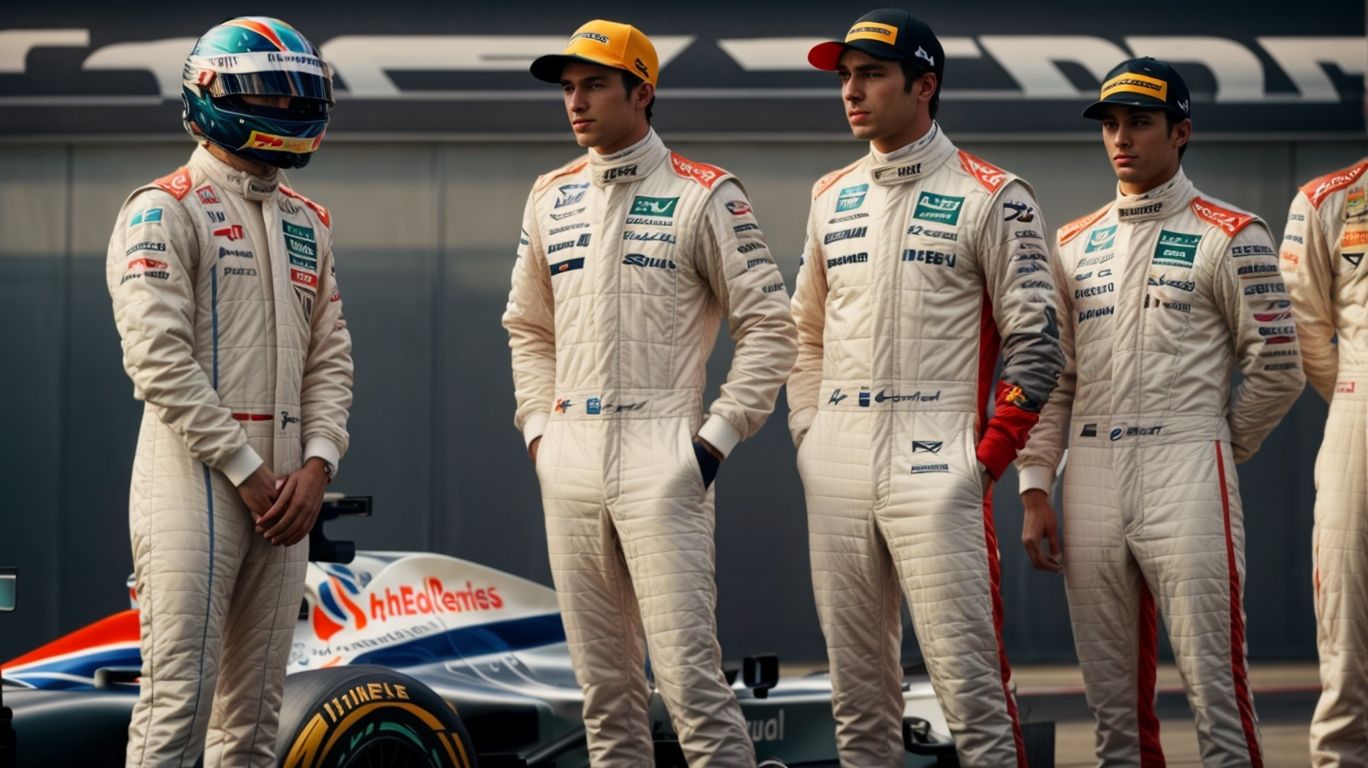Do F1 Drivers Have Agents?
Have you ever wondered what the role of an agent is in the world of sports, particularly in Formula 1 racing?
We will explore the importance of agents for F1 drivers, how they help athletes, and their responsibilities.
Delve into the relationship between F1 drivers and their agents, how drivers choose their representatives, and the process of negotiating contracts.
Join us as we uncover the crucial role agents play in the success of F1 drivers.
Key Takeaways:
– F1 drivers rely on their agents for various tasks such as securing sponsorships and managing their public image.
– When choosing an agent, F1 drivers prioritize qualities such as trustworthiness, experience, and negotiation skills.
What is the Role of an Agent in Sports?
Agents play a crucial role in the world of sports, acting as representatives and facilitators for athletes in various aspects of their professional careers.
These professionals take on a wide array of responsibilities, such as negotiating contracts, managing endorsements, and providing guidance on career decisions. Agents often serve as the intermediary between athletes and teams, ensuring that agreements are fair and beneficial to their clients. Negotiation skills are paramount in their line of work, as they work tirelessly to secure the best deals for the athletes they represent. Agents play a pivotal role in safeguarding athlete interests, steering them towards opportunities that align with their values and goals.
How do Agents Help Athletes?
Agents provide essential support to athletes by handling contract negotiations, maximizing endorsement opportunities, and safeguarding their interests in a competitive sports landscape.
One significant way agents assist athletes is by leveraging their expertise to secure lucrative brand partnerships, ensuring that the athlete’s image aligns with their values and goals. Agents play a crucial role in providing career guidance, helping athletes navigate important decisions such as team transfers, media opportunities, and long-term financial planning.
Agents often act as a bridge between athletes and legal counsel, ensuring that all contracts and agreements are reviewed thoroughly to protect the athlete’s rights and interests. This collaboration helps athletes make well-informed decisions and avoid potential legal pitfalls in their careers.
What are the Responsibilities of an Agent?
An agent’s responsibilities encompass legal representation, contract negotiations, brand endorsements, and strategic career planning to ensure the success and well-being of the athletes they represent.
Agents play a crucial role in athlete welfare by advocating for their client’s best interests in every aspect, from negotiating fair contracts to ensuring their overall well-being both on and off the field. They also handle the complexities of financial management, overseeing budgets, investments, and ensuring that their athletes are prepared for life after sports. Agents are vital in securing lucrative marketing deals for athletes, leveraging their network of connections to form beneficial partnerships that enhance the athlete’s brand and visibility in the industry.
Do F1 Drivers Have Agents?
Representation by agents is common among F1 drivers, who rely on these professionals to navigate the complexities of contract negotiations, sponsorships, and career decisions.
These agents play a pivotal role in not only securing lucrative performance deals with top race teams but also in managing a myriad of business partnerships and endorsements. They act as the bridge between drivers and their various stakeholders, ensuring that the interests of the driver are always at the forefront during each transaction. Agents are adept at analyzing market trends and maximizing the commercial value of a driver’s brand, paving the way for long-term success in the competitive world of Formula 1.
What is the Relationship Between F1 Drivers and Agents?
The relationship between F1 drivers and their agents is built on trust, collaboration, and a shared goal of advancing the driver’s career through strategic decision-making and effective representation.
Track performance plays a pivotal role in defining the success of a driver, and agents work closely with the team to analyze data, provide feedback, and strategize improvements. Securing lucrative sponsorship deals is a crucial aspect managed by the agent to ensure financial stability and brand partnerships. This union is not just about securing contracts but nurturing the professional growth of the driver by aligning on short-term objectives while keeping an eye on long-term career goals.
Why Do F1 Drivers Need Agents?
F1 drivers require agents for expert guidance in contract negotiations, career management, brand endorsements, and legal protection, enabling them to focus on their racing while their agents handle the off-track affairs.
These agents play a vital role in securing lucrative performance incentives for drivers through skillful negotiation of contracts with teams and sponsors. They bring in-depth knowledge of the industry, providing valuable insights into making wise decisions regarding commercial deals and strategic partnerships to maximize the driver’s earning potential.
Agents offer crucial support in long-term career planning, helping drivers navigate the complexities of the F1 world and ensuring they are always in the best position to achieve success on and off the track.
How Do F1 Drivers Choose Their Agents?
Selecting agents involves F1 drivers evaluating factors such as experience, industry connections, track record, and personal rapport to ensure a productive and successful partnership.
When F1 drivers embark on the search for an agent to represent their interests, they delve deep into various aspects to find the perfect match. One key criterion is the expertise of the agent, assessing if they possess the necessary knowledge of the racing world and the ability to navigate its complexities. Effective communication skills play a pivotal role, as agents must convey negotiations, contracts, and opportunities clearly and accurately. The reputation of an agent also holds great significance, with drivers looking at past successes and team principal relationships to gauge their standing in the industry.
What Qualities Do F1 Drivers Look for in an Agent?
F1 drivers seek agents who exhibit professionalism, integrity, exceptional communication skills, and a deep understanding of the motorsport industry to effectively represent and advocate for their interests.
These drivers place immense importance on having agents who possess a network of relationships with key individuals in the industry, such as technical directors and team managers, enabling smooth negotiations and favorable deals. The ability to secure lucrative sponsor agreements and draft meticulous contract terms is paramount. The ideal agent is not only skilled in negotiation prowess but also conducts business with the highest ethical standards, ensuring that their client’s best interests are always the top priority.
How Do Agents Benefit from Representing F1 Drivers?
Agents derive benefits from representing F1 drivers by forging valuable partnerships, securing lucrative deals, enhancing their industry reputation, and contributing to the success and growth of the drivers they represent.
Collaborating with F1 drivers often opens up a variety of financial rewards for agents, allowing them to negotiate high-value contracts, endorsements, and partnerships. Such collaborations offer agents increased industry visibility, as they get the opportunity to work with globally recognized athletes and prestigious race teams, thereby boosting their professional standing within the motorsport community. This exposure can lead to a network of connections and opportunities for agents to expand their client base and secure long-term relationships.
Brand sponsorships and endorsements play a crucial role in elevating the profile of both the F1 driver and the agent, creating a win-win situation where both parties benefit from the increased visibility and financial gains. Tracking performance metrics and success while working with F1 drivers allows agents to measure their impact and showcase their abilities in negotiating, marketing, and management, further enhancing their credibility in the competitive sports representation industry.
What is the Process of Negotiating Contracts for F1 Drivers?
Negotiating contracts for F1 drivers involves a detailed process where agents, drivers, and team representatives collaborate to define terms, conditions, performance incentives, and contractual obligations.
One of the critical aspects of F1 contract negotiations is the inclusion of technical partnerships, where teams often seek agreements allowing access to proprietary technology or collaborative research opportunities. These partnerships play a significant role in enhancing a team’s competitive edge through shared knowledge and resources.
Negotiations also delve into performance clauses, which outline specific benchmarks or achievements that must be met for certain bonuses or extensions to come into effect. These clauses ensure that both parties have a clear understanding of performance expectations and rewards.
What Factors are Considered in Contract Negotiations?
Contract negotiations in F1 consider factors such as performance incentives, sponsorship endorsements, confidentiality clauses, image rights, and legal obligations to create mutually beneficial agreements for all parties involved.
When negotiating contracts for Formula 1 drivers, financial terms play a crucial role, determining the salary, bonuses, and potential revenue streams from race team collaborations. Brand partnerships are carefully chosen to align with the driver’s image and appeal to specific target audiences. Confidentiality agreements are commonplace to protect sensitive team information and trade secrets, while logistics agreements ensure smooth travel arrangements and accommodations during the intense racing season. Legal counsel becomes essential to ensure that all contractual terms are legally sound and that both parties’ interests are safeguarded.
What are the Common Terms in F1 Driver Contracts?
Common terms in F1 driver contracts encompass exclusivity agreements, duration of services, performance bonuses, sponsorship obligations, confidentiality clauses, and dispute resolution mechanisms to ensure clarity and compliance.
Exclusivity agreements often outline that the driver will exclusively race for the team during the contract period, restricting participation in other racing categories or events.
The duration of services specified in the contract typically ranges from one to several years, with options for extension based on performance.
Performance bonuses are structured to reward drivers for achieving specified goals such as race wins, podium finishes, or championship titles.
Sponsorship obligations require drivers to promote team sponsors actively through appearances, social media, and other agreed-upon channels.
Confidentiality clauses safeguard sensitive team and technical information, ensuring it remains within the team and is protected from competitors.
Dispute resolution mechanisms often involve arbitration or mediation to settle disagreements efficiently, keeping the focus on racing performance and team success.
Conclusion: The Importance of Agents for F1 Drivers
Agents play a pivotal role in ensuring the professional success and well-being of F1 drivers, offering expert guidance, strategic representation, and invaluable support in navigating the competitive world of Formula 1 racing.
Hospitality partnerships are a key aspect facilitated by agents, providing drivers with access to exclusive events and networking opportunities. Beyond just race results, agents help in crafting communications strategies to enhance a driver’s public image, manage media relations, and secure lucrative commercial endorsements. These partnerships not only boost a driver’s financial stability but also open doors to new avenues within the motorsport industry, fostering long-term career growth and sustainability.
Frequently Asked Questions
Do F1 Drivers Have Agents?
Yes, most F1 drivers have agents or managers who handle their contracts, negotiations, and other business matters.
What is the role of an agent for an F1 driver?
An agent for an F1 driver is responsible for managing their contracts, negotiating deals, and handling their business affairs.
Do all F1 drivers have the same agent?
No, each F1 driver typically has their own individual agent or manager who represents their interests and works on their behalf.
How do agents benefit F1 drivers?
Agents help F1 drivers secure sponsorships, negotiate better contracts, and manage their schedules and other business obligations, allowing the drivers to focus on their performance on the track.
Can F1 drivers have multiple agents?
Yes, some F1 drivers may choose to have multiple agents or managers to handle different aspects of their careers, such as one for contracts and another for public relations.
Are agents necessary for F1 drivers?
While not all F1 drivers have agents, having one can greatly benefit their careers and help them navigate the complex world of Formula One racing and its business aspects.

